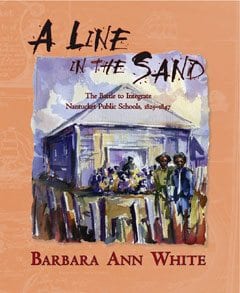

In “A Line in the Sand: The Battle to Integrate Nantucket Public Schools, 1829-1847,” author Barbara Ann White explores in detail the battle that engulfed the entire town and drew the interest of nationally recognized abolitionists like William Lloyd Garrison. (Image courtesy of Spinner Publications)
Nantucket resident and retired school teacher Barbara Ann White, 59, realized a long-held dream on Wednesday, as more than 30 years of research came to fruition with the release of her new book, “A Line in the Sand.”
The book details the integration of Nantucket Public Schools between 1825 and 1847, a battle that engulfed the entire town and involved nationally recognized abolitionists such as William Lloyd Garrison.
“I think it’s just a good story. It’s full of drama,” White said. “Obviously, to me, the most important thing is that it’s given print so Nantucket’s role is recognized.”
Much like the struggle for civil rights in the 1960s, the black community organized boycotts, mounted protests, held conventions and sang songs. They attended town hall and school committee meetings, eventually petitioning the state government and prompting the first law guaranteeing equal education in public schools.
“This was truly a battle,” White said. “I admire the spirit. Every year they [faced] defeat and every year they [tried] again.”
White’s infatuation with the story began in the late 1970s, when she was working on her master’s degree in Boston University’s African American Studies program. On sabbatical from her teaching position in the Nantucket Public Schools, White had to commute every week from the island. At the time, she also had two young children at home.
“I tried to, as much as I could, do my research here, so I didn’t have to stay in Boston way too long,” White said.
It was this reluctance to leave the island and a serendipitous history assignment that led White to what became a lifelong passion.
“When I had to write this paper, I said, ‘Gee, I wonder if there’s any history on Nantucket,’” White said. “I knew nothing, underscore underscore, nothing about Nantucket history.”
After poring through town records, newspapers and letters, White realized she had enough material to expand the piece beyond a paper and into a book, “The African School and the Integration of Nantucket Public Schools.” Although her work was published by BU in 1978, thanks to a Rockefeller grant, White felt unsatisfied leaving the story as it was.
“I have gone through every page. I’ve gone back through every record,” she said. “I began seeing the flaws and where there was even misreading, or a major player that never got in print.”
White’s career as a teacher gave her little opportunity to seriously pursue her interest. She kept a binder of clippings related to the book and that piqued her curiosity. After her retirement five years ago, White returned to her studies in earnest.
Around the same time, BU wanted to print a third edition of her book.
“I said, ‘No, we really need to do this right,’” White said. “An expanded version — I wanted it to look sellable. But they didn’t have the resources.”
That left White to confront a new struggle. Without a publisher ready to produce the book the way she wanted it, she needed funds to publish it on her own.
Reluctant to raise funds — she openly admits to “loathing” it — White’s friends organized a collection, garnering modest donations from members of the community and off-islanders, and even contributed money themselves.
“I am just so grateful. Thanks to them, really, this book is in print,” White said.
White, however, does not intend to end her studies anytime soon. She is already working on another book about major figures in Nantucket.
“I am sure when I start research again in the fall, I’m going to find new stuff. It’s looking under every stone,” she said.






